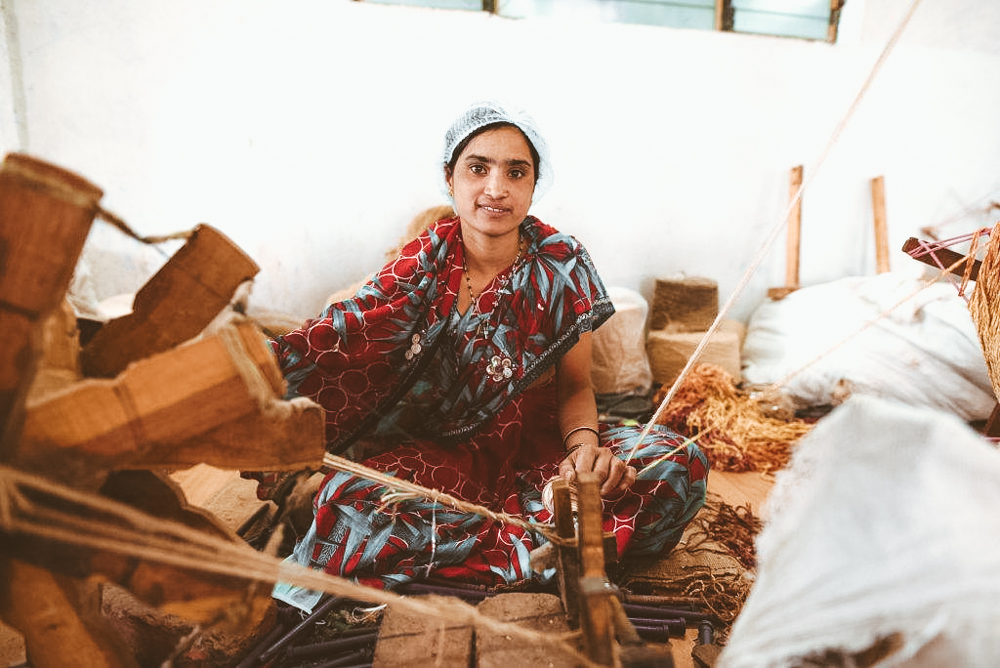What Does Breaking Up With Fast Fashion Have To Do With Women’s Empowerment? Everything.

Photo: Remake
I vividly remember my favorite denim jacket starting to fray, and my ironing on a Madonna patch. That’s what we did in the 1990s. Loved, repaired and personalized our fashion because it was all about individual style.
Fast forward to now, and I watched a friend’s daughter see her Forever21 skirt’s button come undone. She shrugged and tossed it straight into the trash. When I asked her why she couldn’t sew the button back, she said she did not know how and anyway the skirt only cost $15.90.
The average consumer is now purchasing 60 percent more items of clothing compared to 2000, but each garment is kept half as long. Between 2000 and 2015, global fashion production had doubled, while the average number of times that a garment is worn before disposal declined by 36 percent. In China, it declined by 70 percent.
Therein lies the problem with fast fashion. Fast fashion is like fast food—sold to us as convenient, cheap, fast—but in fact, it has enormous impacts on people and our planet.
First, fast fashion is built for rapid obsolescence – which is why Forever21 or H&M’s tees and dresses have running seams and poorly attached buttons and fasteners. These badly constructed clothes are meant to fall apart after a handful of washes, contributing to the 80 lbs of textile waste each American sends to landfill every year.
Carting our clothes off to Goodwill may make us feel better but here in the US only 10% of what we donate is resold. Most clothes end up in landfills. Natural fabrics like cotton, silk, and wool are biodegradable and break down in landfills. But fast fashion is often blended with non-biodegradable fabrics such as polyester, spandex, and nylon, which can take 20 to 200 years to degrade.
We don’t think of the fashion industry as heavily polluting but the amount of water used and the carbon impact of our clothes is staggering. It takes 2,720 liters of water to make just one t-shirt – that’s how much we normally drink in 3 years. Projections by 2050 have us up against difficult questions such as are we going to have enough drinkable water for the world’s growing population or use it to grow cotton?
But the biggest reason why I think we must break up with fast fashion is that it is disempowering to women. It takes a 100 human hands to bring every piece of our clothes to life. Of the 60-75 million people who make our clothes, 80% are women in their early twenties.
The fashion industry is highly profitable. In 2016 revenue was 1.5 trillion, yet, wages for the women who power this industry are half of what she would need to meet a living standard, as in having enough to eat, get to work safely and have a secure place to live.
At Remake we document her life as a way to bring this forgotten part of the industry back into consumer consciousness. I have personally met women working in factories who because of a toothache, a death in the family, fall heavily into debt and have to take up precarious sex work on the side.
Across the US, it’s been heartening to see the groundswell of support for the #metoo movement. To see celebrities, models, and everyday women rise up to say, we want to end misogyny, to being harassed at work or assaulted on campus.
Yet it’s mostly women, the same demographic as readers of Teen Vogue, who bring our clothes to life. They are up against most supervisors and managers in factories being men while it is women who sit on the factory floor. Women are routinely fired for being pregnant and harassment and abused in factories and on her walk home. Where is the #metoo movement for her?
In spending the last decade working on the inside of the fashion industry, I realized what we need is a movement to make fashion a force for good.
Which is why I started Remake—to create a groundswell of people that want to get to know the women who make our clothes and are moved to break up with fast fashion and go back to the days of fewer better things. We can all be a part of the solution by putting fashion on our bodies that align with our value system. At Remake we are constantly highlighting brands that are thinking about water stewardship, climate change leadership and the wellbeing of the women who make our clothes.
I hope that you will join me in this slow fashion journey. It does not have to be overwhelming. It’s not about throwing everything out but just thinking about rewarding better brands the next time you donate and clear out your closet.
I often get the question; I love fashion, are you talking about my needing to buy an ugly hemp sack as a pity purchase? The truth is the conscious fashion game is changing—from Cuyana to Reformation to Mara Hoffman it’s getting easier to find fair fashion that’s stylish and ethical. Where I sit in Silicon Valley, there is also a lot of interesting innovation happening – from rental models like Rent the Runway and Le Tote to peer to peer borrowing like LuxeVillage.
So this new year, let’s remake our closet to truly reflect our values and the world we want to live in.
FROM THE EDITOR
At Conscious, we feature powerful stories about global initiatives, innovation, community development, social impact and more. You can read more stories like this and connect with a growing community of global leaders when you join as a member.



